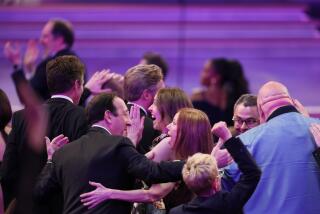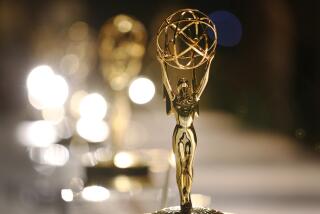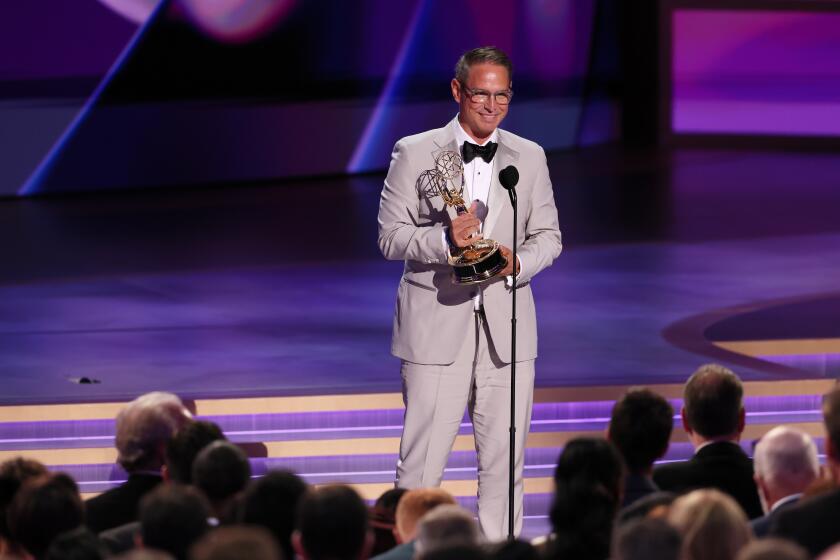When it comes to Emmy-nominated comedies, it’s no longer hip to be square
Awards and nominations for awards are a snapshot of a herd, but what makes up the herd and where it heads changes over time. In the 2011 Emmy race for comedy series, every nominee (along with nearly all the acting nods) came from broadcast television. This year, they come almost entirely from premium cable, basic cable and streaming platforms — significant, perhaps, but not surprising. The Television Academy’s aggregate tastes, viewing habits and fundamental sense of what television can or should be naturally alter as younger people join and older ones depart for that undiscovered country from which no series is rebooted.
That there is too much television to watch, in a time when we increasingly feel a social responsibility to watch it, means we’re more responsive than ever to word-of-mouth and recommendation algorithms in deciding where to park our eyes. Given our social media-driven obsession with novelty and the click-around, cable-cutting way we watch, it only makes sense that the Emmys are moving gradually from a field that celebrates old favorites, time after time after time, into one where newness plays a greater part. Based on the number of times I’ve been told or asked or overheard conversations about them over recent months, I would have been shocked to find “Russian Doll” and “Fleabag” — or their creator-stars Natasha Lyonne and Phoebe Waller-Bridge — going without nominations. And there they are.
Of the comedy series nominees this year, only one, NBC’s tightly plotted, heavenly hellish afterlife show, “The Good Place,” comes from a broadcast network, surely helped by its streaming life on Hulu. (Network sitcoms also landed only two acting nominations: “The Good Place” star Ted Danson and Anthony Anderson for ABC’s “black-ish.”) It’s joined by HBO’s returning contenders “Veep,” never not nominated in seven seasons; “Barry,” about an assassin/aspiring actor, named in each of its two; and Amazon’s twice-recognized “The Marvelous Mrs. Maisel,” also in its second season.
New to the field are the sexually forward, gleefully grim “Fleabag,” from Amazon; Netfix’s multi-planar, time-twisting epic of self-actualization, “Russian Doll”; and that Little Engine That Could, “Schitt’s Creek,” in which a family is enriched by the loss of its riches — the last of these belatedly benefiting from a presence on Netflix to earn a nomination for its fifth season on basic cable’s Pop. (HBO, which one can access directly now without the benefit — or deficit — of a cable subscription, is effectively a streaming platform now.) All, even “The Good Place,” run to shorter seasons than the usual broadcast model, and all are guided firmly by their creators, or co-creators, who in more than half the cases are also their stars.
That most of these series tack closer to the edge than to the mainstream aligns with our growing impression that television is important and something we want to challenge as much as comfort us. (Or at least appear to challenge us, while actually comforting us.) Like other big awards, the Emmys have rarely celebrated an absence of quality, but they have in the past often seemed stodgy, stuck in a rut: For years, the Emmys could seem like an anniversary celebration of “Modern Family” or “The Big Bang Theory.” Both were shut out of the major categories this year.
There is a continuing tendency to let a few shows dominate the nominations — along with star Bill Hader, “Barry” this year has three out of six supporting actor nods, for Stephen Root, Henry Winkler and Anthony Carrigan, and a supporting actress nomination for Sarah Goldberg. And it wouldn’t be the Emmys without a nod for “Veep” star Julia Louis-Drefyus. On the one hand, voters can be lazy; on the other, if you like a show, it stands to reason you like the people in it.
Nevertheless, the nominations have felt a little more, let’s say, hip of late — more in tune with wilder prevailing winds. If this is just to say that they reflect a more engaged, excited conversation about the shape and tone and uses of comedy, well, welcome to the world, Academy of Television Arts & Sciences. And comic treasures Catherine O’Hara and Eugene Levy — a historically matched set from their days on “SCTV” — being recognized for “Schitt’s Creek” — an outlier among outliers — feels like a kind of triumph. To put it another way, not just an honor to be nominated but also nominations to be honored.
More to Read
The complete guide to home viewing
Get Screen Gab for everything about the TV shows and streaming movies everyone’s talking about.
You may occasionally receive promotional content from the Los Angeles Times.







